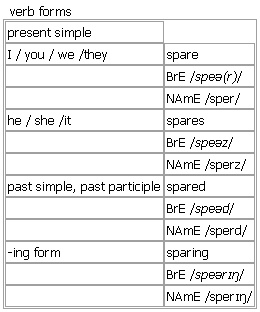 spare
spare

▪ I. spare [spare spares spared sparing] adjective, verb, noun BrE [speə(r)] NAmE [sper]
adjective
NOT USED/NEEDED
1. usually before noun that is not being used or is not needed at the present time
• We've got a spare bedroom, if you'd like to stay.
• I'm afraid I haven't got any spare cash.
•Are there any tickets going spare (= are there any available, not being used by sb else)?
EXTRA
2. only before noun kept in case you need to replace the one you usually use; extra
•a spare key/tyre
• Take some spare clothes in case you get wet.
TIME
3. available to do what you want with rather than work
• He's studying music in his spare time.
• I haven't had a spare moment this morning.
PERSON
4. thin, and usually quite tall
Word Origin:
Old English spær ‘not plentiful, meagre’, sparian ‘refrain from injuring’, ‘refrain from using’, of Germanic origin; related to Dutch and German sparen ‘to spare’.
Thesaurus:
spare adj.
1. usually before noun
•I haven't got any spare cash.
surplus • • excess • • superfluous • • leftover •
spare/surplus/excess cash/capacity/energy
Spare, surplus or excess? Spare is the most informal and common of these words. Surplus is often used in business contexts: surplus stock/products, surplus capital/income. To talk about an extra amount that is seen as a bad thing, excess is often used: excess fat/baggage
2.
•He's studying music in his spare time.
free • • available •
spare/free/available time
a spare/free morning/afternoon/weekend/moment
Example Bank:
•I haven't had a spare moment this morning.
•I'm afraid I haven't got any spare cash.
•We've got a spare bedroom, if you'd like to stay.
Idioms: ↑go spare ▪ ↑spare somebody's blushes ▪ ↑spare somebody's feelings
verb
TIME/MONEY/ROOM/THOUGHT, ETC.
1. to make sth such as time or money available to sb or for sth, especially when it requires an effort for you to do this
•~ sth/sb I'd love to have a break, but I can't spare the time just now.
•Could you spare one of your staff to help us out?
•~ sth/sb for sb/sth We can only spare one room for you.
•You should spare a thought for (= think about) the person who cleans up after you.
•He was late, but he spared a glance for the pretty girl at the desk.
•~ sb sth Surely you can spare me a few minutes?
SAVE SB PAIN/TROUBLE
2. to save sb/yourself from having to go through an unpleasant experience
•~ sb/yourself sth He wanted to spare his mother any anxiety.
•Please spare me (= do not tell me) the gruesome details.
•You could have spared yourself an unnecessary trip by phoning in advance.
•~ sb/yourself from sth She was spared from the ordeal of appearing in court.
NOT HARM/DAMAGE
3. usually passive ~ sb/sth (from sth) (formal)to allow sb/sth to escape harm, damage or death, especially when others do not escape it
•~ sb/sth (from sth) They killed the men but spared the children.
•During the bombing only one house was spared (= was not hit by a bomb).
•~ sb/sth sth Hong Kong was spared a direct hit, but the storm still brought heavy rains and powerful winds.
NO EFFORT/ EXPENSE, ETC.
4. ~ no effort, expense, etc. to do everything possible to achieve sth or to do sth well without trying to limit the time or money involved
•He spared no effort to make her happy again.
•No expense was spared in furnishing the new office.
WORK HARD
5. not ~ yourself to work as hard as possible
Verb forms: 
Word Origin:
Old English spær ‘not plentiful, meagre’, sparian ‘refrain from injuring’, ‘refrain from using’, of Germanic origin; related to Dutch and German sparen ‘to spare’.
Example Bank:
•Can you spare a second to give me a hand?
•Can you spare some money for the homeless?
•Have you any money to spare?
•She hardly spared him a second glance.
•The children were spared from the virus.
•The storm largely spared Houston and surrounding districts.
•We should get there with half an hour to spare.
•During the bombing only one house was spared.
•She begged them to spare her life.
noun
1. an extra thing that you keep in case you need to replace the one you usually use (used especially about a tyre of a car)
•to get the spare out of the boot/trunk
• I've lost my key and I haven't got a spare.
2. sparesplural (especially BrE) = ↑spare parts
• It can be difficult to get spares for some older makes of car.
Word Origin:
Old English spær ‘not plentiful, meagre’, sparian ‘refrain from injuring’, ‘refrain from using’, of Germanic origin; related to Dutch and German sparen ‘to spare’.
▪ II. to ˈspare idiom
if you have time, money, etc. to spare, you have more than you need
•I've got absolutely no money to spare this month.
•We arrived at the airport with five minutes to spare.
Main entry: ↑spareidiom
|
|
